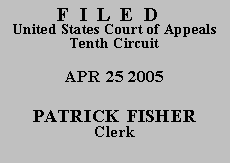 UNITED STATES COURT OF APPEALS
UNITED STATES COURT OF APPEALS
 UNITED STATES COURT OF APPEALS
UNITED STATES COURT OF APPEALS
| JIMMY PHILLIPS,
Petitioner-Appellant, v. MELINDA GUILFOYLE, Respondent-Appellee. |
(CV-04-627-M) (W. D. Okla.) |
On July 18, 1986, Phillips was paroled from a sentence imposed in 1970. While on parole, Phillips was convicted on new charges and returned to the custody of the Oklahoma Department of Corrections ("DOC") on seventeen concurrent twenty-year sentences. On September 20, 1988, Phillips' original parole was revoked, with the remainder of his original sentence to run consecutively to the more recent convictions. Phillips discharged the sentences on the more recent convictions on October 29, 2002 and was rebilled to his parole revocation sentence. On May 19, 2004, Phillips filed the instant petition in federal district court pursuant to § 2241.(1) In his habeas petition, Phillips argued that he did not receive Ekstrand(2) credits for job assignments from 1972 to July 1973 and from 1974 to October 1984, that the DOC's policy regarding compliance with Ekstrand "violates the U.S. District Court for the Eastern District of Oklahoma 1993 ruling in Scales v. Reynolds," and finally that the DOC policy providing that inmates incarcerated as parole violators are subject to loss of the credits they earned prior to parole violates his due process rights. The district court dismissed his claims as time-barred after taking judicial notice that since 1976 Oklahoma law has required that the accumulated time of every inmate be tallied monthly and that a copy be provided to the inmate. It concluded that Phillips, through the exercise of due diligence, under § 2244(d)(1), should have been aware of the credits supposedly due him in the 1970's and 1980's, prior to the expiration of the one year grace period established by AEDPA and Hoggro v. Boone, 150 F.3d 1223, 1225-26 (10th Cir. 1998). It thus dismissed Phillips' habeas petition as untimely because it was filed well after the expiration of the AEDPA grace period on April 24, 1997.(3)
We have carefully reviewed the record on appeal, and conclude that the district court correctly denied Phillips' habeas petition as untimely. Therefore, we APPROVE Phillips' request to proceed in forma pauperis, DENY his application for a COA and DISMISS the appeal.
ENTERED FOR THE COURT
Carlos F. Lucero
Circuit Judge
1. Phillips' petition was filed after April 24, 1996, the effective date of the Antiterrorism and Effective Death Penalty Act ("AEDPA"); as a result, AEDPA's provisions apply to this case. See Rogers v. Gibson, 173 F.3d 1278, 1282 n.1 (10th Cir. 1999) (citing Lindh v. Murphy, 521 U.S. 320 (1997)). AEDPA conditions a petitioner's right to appeal a denial of habeas relief under § 2241 upon a grant of a COA. 28 U.S.C. § 2253(c)(1)(A); Montez v. McKinna, 208 F.3d 862 (10th Cir. 2000) (holding that § 2253(c)(1)(A) requires a state prisoner to obtain a COA regardless of whether he is seeking relief under § 2254 or under § 2241). A COA may be issued "only if the applicant has made a substantial showing of the denial of a constitutional right." § 2253(c)(2). This requires Phillips to show "that reasonable jurists could debate whether (or, for that matter, agree that) the petition should have been resolved in a different manner or that the issues presented were adequate to deserve encouragement to proceed further." Slack v. McDaniel, 529 U.S. 473, 484 (2000) (quotations omitted). Because the district court denied Phillips a COA, he may not appeal the district court's decision absent a grant of COA by this court.
2. In Ekstrand v. Oklahoma, 791 P.2d 92 (Okla. Crim. App. 1990), overruled on other grounds by Waldon v. Evans, 861 P.2d 311 (Okla. Crim. App. 1993), the Oklahoma Court of Criminal Appeals held that Oklahoma inmates who had been convicted of offenses committed before the effective date of amendments to Oklahoma's earned credit statute were entitled to "the credits allotted under the statute effective on the date their crime was committed" if they were "disadvantaged by the amended statute. . . ." Ekstrand, 791 P.2d at 95.
3. The district court noted that Phillips, in arguing that his motion was timely, attached a document entitled "Oklahoma Department of Corrections Time Sheet for the Month of May 31, 2004" that shows 23,519 "Days Remaining" for his sentence, which did not appear to contain any earned credit tally. This contrasted with the affidavit of Jim Rabon, the Administrator of Sentence Administration and Offender Records for the DOC, which indicated that the remaining days on Phillips' sentence were 11,141 as of the end of May 2004. The district court specifically reminded Phillips that if he has a claim that his sentence tally is incorrect based upon this document, such a claim would not be barred by the AEDPA limitation period, and could be brought after exhaustion of any available state remedies. We remind Phillips that any claim based on the information in this document must be filed prior to the running of the AEDPA statute of limitations applicable to that claim.